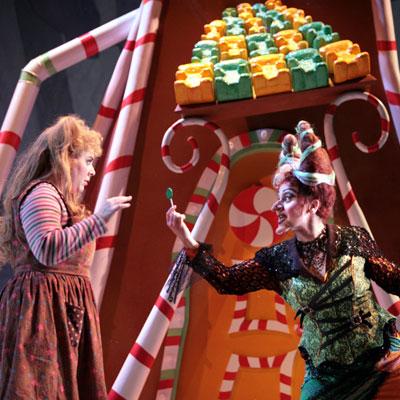Gingerbread Witch in ‘Hansel and Gretel’: O.K. for Kids
By • January 3, 2013 0 2543

(This is the fifth in a series of articles about Washington performers, singers and actors who are playing iconic roles during the holiday season at various venues).
Per his professional biography, the American tenor Corey Evan Rotz has sung more than 400 performances with the Washington National Opera since making his 1995 debut in “Der Rosenkavalier.” So, he’s used to Washington audiences. Friday, he may have a different experience.
“I expect to hear some boos,” Rotz said. “There will be children there who may not like me or what I do in this part.”
That part is the role of the witch in the WNO’s production of Engelbert Humperdinck’s “Hansel and Gretel.” Rotz, in a bit of unusual casting, will be playing the menacing gingerbread witch—one of the classic villains not only of opera but of fairy tales and fictions.
“I’ve done all sorts of roles over the years,” said Rotz, 40, a Pennsylvania native who has settled in Washington. “But this is very different from anything I’ve ever done. It’s funny, when it was suggested that I play the witch, I thought, ‘Huh. But why not?’ I jumped at the chance. I think it’s a real challenge—you really have to be an actor as well as a singer. You have to be convincing.”
“Hansel and Gretel”—which comes from one of the Grimm Brothers’ more famous fairy tales—is a bona-fide, full-length opera which will be performed at the Kennedy Center’s Terrace Theater Dec. 21 through 23. Humperdinck was one of the great composers of the 19th century and got the idea at the urging of his sister who had written some German folk songs on the theme of the Grimms’ fairy tale. Humperdinck apparently liked that idea and termed the result a “fairy tale opera.” It proved to be a winner and is a staple of opera companies throughout the world. It was also something of an event in its various debuts, among them in Weimar in 1893, conducted by Richard Strauss—and in Hamburg by Gustav Mahler.
“I supposed it could be a little bit scary for children, but I think it has a very triumphant ending,” Rotz said. “I know these are troubling time for little kids.” The opera is deemed appropriate for ages nine and above; there will be small children in the audience.
It’s a bit of a jump for Rotz, who’s been a mainstay for WNO audiences in a variety of roles, many of them with German themes or by German composers. He has performed roles in “The Magic Flute,” “The Queen of Spades,” “Salome,” Arturo in “Lucia di Lammermoor” and Bacchus in “Ariadne of Naxos.” He made his Los Angeles Opera debut as Abace in “Idomeneo” and his Carnegie Hall debut as Raymond in Tchaikovsky’s “The Maid of Orleans.” He also appeared in the WNO production of “Othello,” which toured in Japan with Placido Domingo.
“ ‘Hansel and Gretel’ isn’t just a children’s opera per se,” Rotz said. “It’s a major work by a major composer. ‘The Magic Flute’ is also considered something of a family opera, but it’s very much Mozart.”
The cast also includes Sarah Mesko and Julia Mintzer as Hansel; Emily Albrink and Shantelle Przybylo as Gretel; Norman Garrett as the father; Maria Eugenia Antunez as the mother—with Jessica Stecklein, playing dual roles as the Dew Fairy and the Sandman.
“Hansel and Gretel” is being presented as the WNO’s new commitment to family programming during the holiday season and is expected to be a regular part of the WNO seasonal programming in the future.
Although he performs in other venues, the Washington National Opera is essentially the beacon, the mainstay, the home of Rotz’s career. “It’s home,” he said. “Every time I perform here, it’s like going home. I know the stagehands, everybody that works here, from top to bottom. So, it’s always a great experience for me. That’s why I’ve decided to live here.
“I would say that the witch is probably the most challenging part of I’ve done, simply because the role is so different,” Rotz said.
It is a very audience-involving opera. Hence, the boos.
“I think there will be some,” Rotz said. “But I don’t think—given the news and what happened in Connecticut—that the witch and the opera is too frightening for children. And it ends on a triumphant note. There’s a quote at the end: ‘When we cannot bear our grief, God the lord will send relief.’ ”
- Washington National Opera’s Hansel and Gretel | Karin Cooper for WNO




